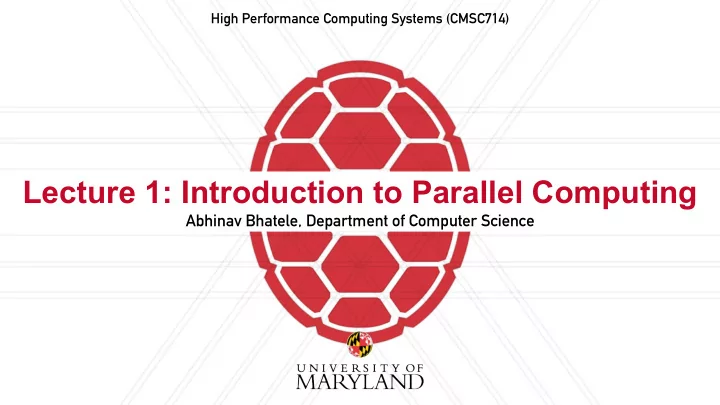

High Performance Computing Systems (CMSC714) Lecture 1: Introduction to Parallel Computing Abhinav Bhatele, Department of Computer Science
A little bit about me … • Ph.D. from the University of Illinois • Spent eight years at Lawrence Livermore National Laboratory • Started at the University of Maryland in August Abhinav Bhatele, CMSC714 2
Introductions • Name • MS or PhD / Department • Area of research • Why this course? • Something interesting/ unique about yourself Abhinav Bhatele, CMSC714 3
This course is • An introduction to parallel computing • Will cover programming models, architectures, tools, systems issues, algorithms and applications • A qualifying course for MS/PhD • Work expected: • Two programming assignments • Mid-term • Group project (3 students per group) • Classroom participation Abhinav Bhatele, CMSC714 4
The need for high performance computing Drug discovery https://www.nature.com/articles/nature21414 Abhinav Bhatele, CMSC714 5
The need for high performance computing Drug discovery Weather forecasting https://www.nature.com/articles/nature21414 https://www.ncl.ucar.edu/Applications/wrf.shtml Abhinav Bhatele, CMSC714 5
The need for high performance computing Study of the universe Drug discovery Weather forecasting https://www.nature.com/articles/nature21414 https://www.nas.nasa.gov/SC14/demos/demo27.html https://www.ncl.ucar.edu/Applications/wrf.shtml Abhinav Bhatele, CMSC714 5
Why do we need parallelism • Make some science simulations feasible in the lifetime of humans • Either due to speed or memory requirements • Provide answers in realtime or near realtime Abhinav Bhatele, CMSC714 6
What is parallel computing? • Does it include: • Grid computing • Distributed computing • Cloud computing • Does it include: • Superscalar processors • Vector processors • Accelerators (GPUs, FPGAs) Abhinav Bhatele, CMSC714 7
Parallel Architecture • A set of nodes or processing elements connected by a network. https://computing.llnl.gov/tutorials/parallel_comp Abhinav Bhatele, CMSC714 8
Interconnection networks A group with 96 Aries routers • Different topologies for connecting nodes together • Used in the past: torus, hypercube • More popular currently: fat-tree, dragonfly Column all-to-all (black) links Row all-to-all (green) links Two-level dragonfly with multiple groups Inter-group (blue) links (not all links are shown) Torus Fat-tree Dragonfly Abhinav Bhatele, CMSC714 9
Memory and I/O sub-systems • Similar issues for both memory and disks (storage): • Where is it located? • View to the programmer vs. reality • Performance considerations: latency vs. throughput Abhinav Bhatele, CMSC714 10
System software: Programming models • Shared memory/ address-space User code • Explicit: Pthreads Parallel runtime • Implicit: OpenMP • Distributed memory Communication library • Explicit: MPI • Implicit: Task-based models (Charm++) Operating system Abhinav Bhatele, CMSC714 11
Performance and debugging tools • Debugging parallel programs is challenging • Performance analysis and tuning is critical but hard [2016.09.02 08:56:12, 2016.09.02 09:15:42] [0, 3.0 TB] 3000 2000 1000 0 0 1.0 TB 2.0 TB 3.0 TB 06 AM https://computing.llnl.gov/tutorials/totalview/ https://vampir.eu/tutorial/manual/performance_data_visualization Abhinav Bhatele, CMSC714 12
Systems Issues • Operating system noise • Network congestion • Congestion-avoiding routing • Parallel I/O • Job scheduling: • Interference from other jobs Abhinav Bhatele, CMSC714 13
Parallel algorithms and applications • Parallel Matrix Multiplication • Parallel Sorting • N-body calculations • Discrete event simulations Abhinav Bhatele, CMSC714 14
Parallel algorithms and applications • Parallel Matrix Multiplication • Molecular dynamics • Parallel Sorting • Computational cosmology • N-body calculations • Weather and climate modeling • Discrete event simulations • Discrete-event simulation Abhinav Bhatele, CMSC714 14
Questions? Abhinav Bhatele 5218 Brendan Iribe Center (IRB) / College Park, MD 20742 phone: 301.405.4507 / e-mail: bhatele@cs.umd.edu
Recommend
More recommend